初中英语语法知识—疑问句的知识点训练
- 格式:docx
- 大小:16.39 KB
- 文档页数:9
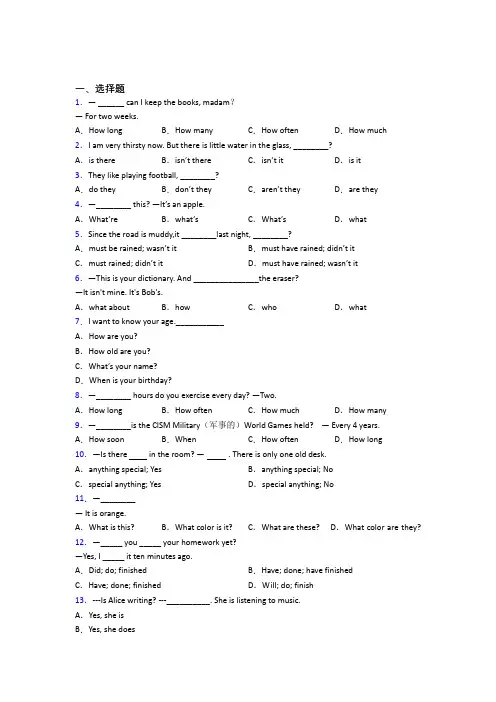
一、选择题1.— ______ can I keep the books, madam?— For two weeks.A.How long B.How many C.How often D.How much2.I am very thirsty now. But there is little water in the glass, ________?A.is there B.isn’t there C.isn’t it D.is it3.They like playing football, ________?A.do they B.don’t they C.aren’t they D.are they4.—________ this? —It’s an apple.A.What’re B.what’s C.What’s D.what5.Since the road is muddy,it ________last night, ________?A.must be rained; wasn’t it B.must have rained; didn’t itC.must rained; didn’t it D.must have rained; wasn’t it6.—This is your dictionary. And _______________the eraser?—It isn't mine. It's Bob's.A.what about B.how C.who D.what7.I want to know your age.___________A.How are you?B.How old are you?C.What’s your name?D.When is your birthday?8.—________ hours do you exercise every day? —Two.A.How long B.How often C.How much D.How many 9.—________is the CISM Military(军事的)World Games held? — Every 4 years.A.How soon B.When C.How often D.How long 10.—Is there in the room? — . There is only one old desk.A.anything special; Yes B.anything special; NoC.special anything; Yes D.special anything; No11.—________— It is orange.A.What is this? B.What color is it? C.What are these? D.What color are they? 12.—_____ you _____ your homework yet?—Yes, I _____ it ten minutes ago.A.Did; do; finished B.Have; done; have finishedC.Have; done; finished D.Will; do; finish13.---Is Alice writing? ---__________. She is listening to music.A.Yes, she isB.Yes, she doesC.No, she doesn’tD.No, she isn’t14.— Books are our friends. ________ do you read books?— I read books every day.A.How soon B.How much C.How often 15.—_________?—It’s next to the library.A.Is there a bank here?B.Is this the bank?C.Excuse me, where’s the bank, please?D.Does your father work in a bank?16.—________talk to someone when you feel sad?—I want to, but I don’t know how to talk with others.A.Why not B.Why don’t C.Why did you D.Why do you 17.—This is my pen. _______ this book?—It’s Bob’s. Look, his name is on it.A.What’s B.Who’s C.What about18.- ______ do you go to visit your grandparents?- Once a week.A.How far B.How much C.How often D.How long 19.—Li Ming, can you sing or dance? —________A.Yes, I can. B.I can sing. C.No, I cannot dance. D.No, I couldn’t. 20.—Excuse me, ________? —Yes. Go along this street and turn right.A.how can I get to the bookstore B.which is the way to the bookstore C.is there a bookstore near here D.where is the bookstore21.— Do you think the students need to have lunch at school?—________ It’s good for them to save time.A.Yes, I think so. B.No, I don’t think so.C.I agree with you. 22.— ________ is the Shanghai Wild Animal Park?—It’s 15km east of the Bund.A.Who B.What C.When D.Where 23.-- ______--No,it’s in the bookcase.A.Where is his dictionary? B.Where are his books?C.Is his book on the desk? D.Is his pencil in the bookcase?24.________your brother________ a baseball?A.Do; have B.Does; has C.Does; have D.Do; has 25.—Where__________ your friend __________from?—He comes from England.A.is; come B.do; come C.does; come D.are; be【参考答案】***试卷处理标记,请不要删除一、选择题1.A解析:A【解析】【分析】【详解】句意:——这些书我能借多长时间?——两周。
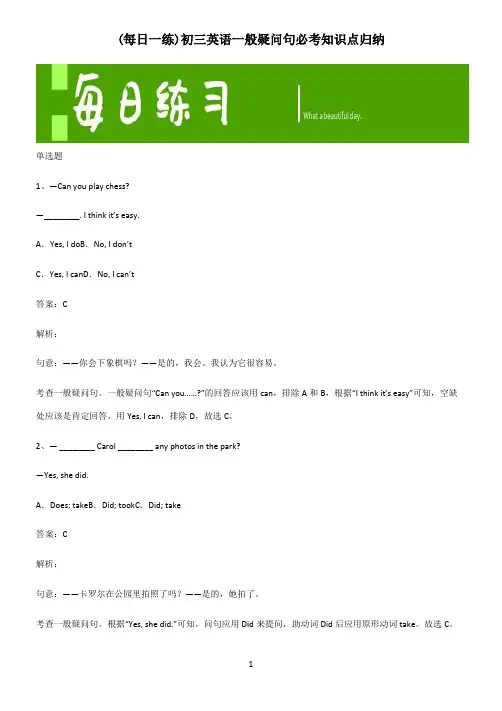
(每日一练)初三英语一般疑问句必考知识点归纳单选题1、—Can you play chess?—________. I think it’s easy.A.Yes, I doB.No, I don’tC.Yes, I canD.No, I can’t答案:C解析:句意:——你会下象棋吗?——是的,我会。
我认为它很容易。
考查一般疑问句。
一般疑问句“Can you……?”的回答应该用can,排除A和B,根据“I think it’s easy”可知,空缺处应该是肯定回答,用Yes, I can,排除D,故选C。
2、— ________ Carol ________ any photos in the park?—Yes, she did.A.Does; takeB.Did; tookC.Did; take答案:C解析:句意:——卡罗尔在公园里拍照了吗?——是的,她拍了。
考查一般疑问句。
根据“Yes, she did.”可知,问句应用Did来提问,助动词Did后应用原形动词take。
故选C。
3、—________ this dog yours? You should keep it home.—I’m sorry, Ms. Clark.A.IsB.AreC.DoD.Does答案:A解析:句意:——这只狗是你的吗?你应该把它关在家里。
——对不起,Clark夫人。
考查一般疑问句。
此句的主语为this dog,是第三人称单数,因此谓语动词用单数,排除B、C;分析句子可知,此句无实义动词,因此用be动词is。
故选A。
4、—Can you join us playing basketball after school today?—Sorry, I ________. I have to go home and finish my homework first.A.mustn’tB.can’tC.needn’tD.couldn’t答案:B解析:句意:——今天放学后你能和我们一起打篮球吗?——对不起,我不能。

一、选择题1.—________, Millie?—It’s February 1st.A.What’s the date today B.What day is it todayC.What time is it D.What’s that2.—________ do you play computer games, Lily?—I only play on Friday night.A.How B.Where C.Why D.When 3.—________ hours do you exercise every day? —Two.A.How long B.How often C.How much D.How many 4.—Is your name Jim Green?—________.A.Yes, I am B.Yes, it isC.No, I am D.Yes, I’m5.—Where__________ your friend __________from?—He comes from England.A.is; come B.do; come C.does; come D.are; be 6.—Are these your schoolbags? —No, __________aren't. They are__________. A.These; their B.they; theirs C.these; ours D.they; ours 7.—________. —It's under the chair.A.Where is my basketball? B.Where are my keys? C.Is it a basketball? 8.—Are these your friends? —________. They are his friends.A.Yes, these are. B.No, they aren't. C.No, these aren't. 9.---Is Alice writing? ---__________. She is listening to music.A.Yes, she isB.Yes, she doesC.No, she doesn’tD.No, she isn’t10.— Why ______ you like the cat?—Because she’s kind of ______.A.do; boring B.don’t; interesting C.do; interested D.don’t; boring 11.—_________?—It’s next to the library.A.Is there a bank here?B.Is this the bank?C.Excuse me, where’s the bank, please?D.Does your father work in a bank?12.—_____ the population of the U.S.A.in 2005? —It _____ about 296 million.A.What is; is B.What was; was C.How many is; was D.How many was; is 13.—Is the young woman playing the violin?—________.A.Yes,she is B.No,she doesn'tC.Yes,she does D.No,he isn't14.We have to swipe our student card (刷学生卡) when we get to or leave school every day, ________ we?A.do B.don’t C.have D.haven’t 15.—The surgeon hasn’t come back, has he?—_______, for he _______ Australia since last week and will be back in a week.A.No; has been in B.No; has gone to C.Yes; has gone to D.Yes; has been in 16.—Excuse me, ________? —Yes. Go along this street and turn right.A.how can I get to the bookstore B.which is the way to the bookstoreC.is there a bookstore near here D.where is the bookstore17.—Can your brother sing or dance?— .A.He can sing. B.Yes, he can. C.He can sing or dance. 18.—____________________ yesterday?—It was between10℃ to 25℃.A.What was the weather like B.What is the temperature C.What was the temperature 19.— _____ do you _____ the book?—It’s very interesting.A.What; like B.What; think of C.How; think D.How; think of 20.—Is Billy rat or thin?—________.A.Yes, he is B.No, he isn't C.He's a new boy D.He's fat 21.—_____ do you play computer games?—Twice a month.A.How long B.How manyC.How often D.How much22.-- ______--No,it’s in the bookcase.A.Where is his dictionary? B.Where are his books?C.Is his book on the desk? D.Is his pencil in the bookcase?23.— Books are our friends. ________ do you read books?— I read books every day.A.How soon B.How much C.How often24.—I have too much housework to do at home!—___________ ask your husband for help?A.You could B.Why don’t C.Why not D.How about25.— do you go to work every day?—By bike.A.What B.Who C.How D.When【参考答案】***试卷处理标记,请不要删除一、选择题1.A解析:A【解析】【分析】【详解】句意:——Millie,今天多少号?——今天二月一日。
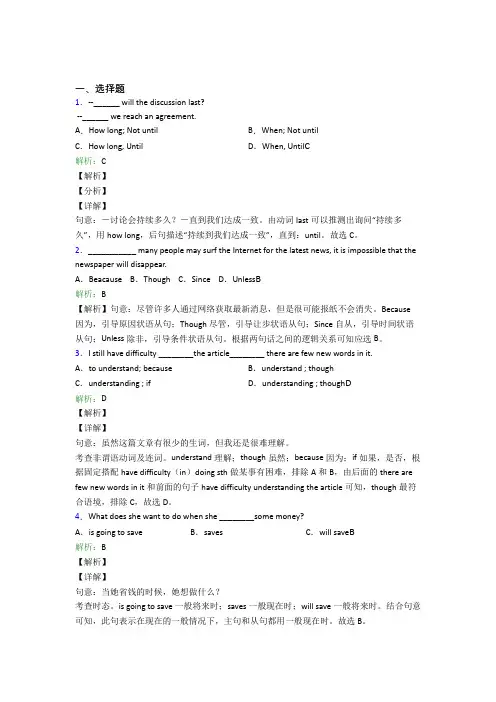
一、选择题1.--______ will the discussion last?--______ we reach an agreement.A.How long; Not until B.When; Not untilC.How long, Until D.When, Until C解析:C【解析】【分析】【详解】句意:-讨论会持续多久?-直到我们达成一致。
由动词last可以推测出询问“持续多久”,用how long,后句描述“持续到我们达成一致”,直到:until。
故选C。
2.___________ many people may surf the Internet for the latest news, it is impossible that the newspaper will disappear.A.Beacause B.Though C.Since D.Unless B解析:B【解析】句意:尽管许多人通过网络获取最新消息,但是很可能报纸不会消失。
Because 因为,引导原因状语从句;Though尽管,引导让步状语从句;Since自从,引导时间状语从句;Unless除非,引导条件状语从句。
根据两句话之间的逻辑关系可知应选B。
3.I still have difficulty ________the article________ there are few new words in it.A.to understand; because B.understand ; though C.understanding ; if D.understanding ; though D解析:D【解析】【详解】句意:虽然这篇文章有很少的生词,但我还是很难理解。
考查非谓语动词及连词。
understand理解;though虽然;because因为;if如果,是否,根据固定搭配have difficulty(in)doing sth做某事有困难,排除A和B,由后面的there are few new words in it和前面的句子have difficulty understanding the article可知,though最符合语境,排除C,故选D。
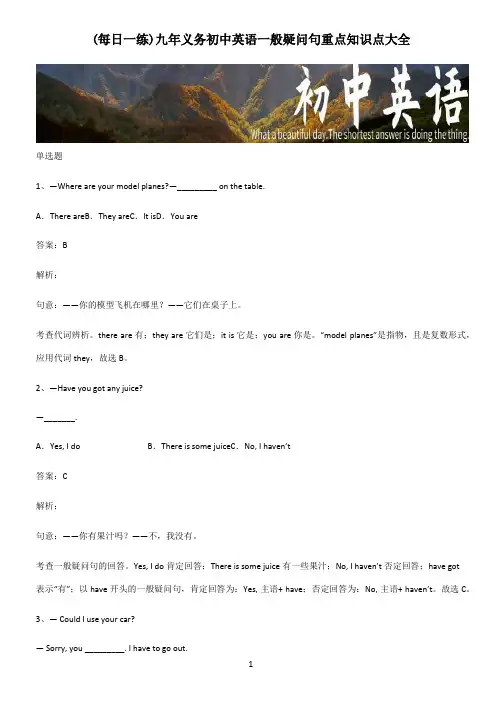
(每日一练)九年义务初中英语一般疑问句重点知识点大全单选题1、—Where are your model planes?—_________ on the table.A.There areB.They areC.It isD.You are答案:B解析:句意:——你的模型飞机在哪里?——它们在桌子上。
考查代词辨析。
there are有;they are它们是;it is它是;you are你是。
“model planes”是指物,且是复数形式,应用代词they,故选B。
2、—Have you got any juice?—_______.A.Yes, I do B.There is some juiceC.No, I haven’t答案:C解析:句意:——你有果汁吗?——不,我没有。
考查一般疑问句的回答。
Yes, I do肯定回答;There is some juice有一些果汁;No, I haven’t 否定回答;have got表示“有”;以have开头的一般疑问句,肯定回答为:Yes, 主语+ have;否定回答为:No, 主语+ haven’t。
故选C。
3、— Could I use your car?— Sorry, you _________. I have to go out.A.couldB.canC.couldn’tD.can’t答案:D解析:句意:——我能用一下你的车吗?——对不起,不行。
我得出去。
考查情态动词。
could可以;can能够;couldn’t 不能;can’t不能。
根据答语Sorry可知,应用否定回答;could 在本题中是委婉的问法,否定回答应用can’t,故选D。
4、—Must I go to bed before 9 o’clock?—No, you ________. You can go to bed by 10 o’clock.A.mustn’tB.can’tC.needn’t答案:C解析:句意:——我必须在9点之前上床睡觉吗?——不,你不必。
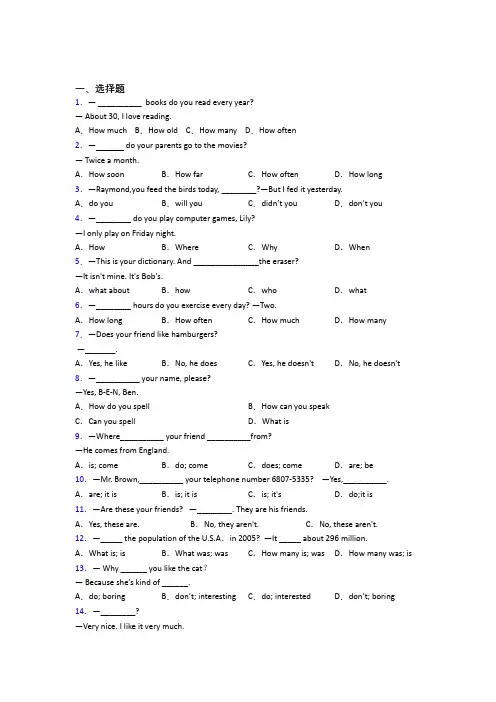
一、选择题1.— __________ books do you read every year?— About 30, I love reading.A.How much B.How old C.How many D.How often2.— do your parents go to the movies?— Twice a month.A.How soon B.How far C.How often D.How long 3.—Raymond,you feed the birds today, ________?—But I fed it yesterday.A.do you B.will you C.didn’t you D.don’t you 4.—________ do you play computer games, Lily?—I only play on Friday night.A.How B.Where C.Why D.When 5.—This is your dictionary. And _______________the eraser?—It isn't mine. It's Bob's.A.what about B.how C.who D.what6.—________ hours do you exercise every day? —Two.A.How long B.How often C.How much D.How many 7.—Does your friend like hamburgers?—_______.A.Yes, he like B.No, he does C.Yes, he doesn't D.No, he doesn't 8.—__________ your name, please?—Yes, B-E-N, Ben.A.How do you spell B.How can you speakC.Can you spell D.What is9.—Where__________ your friend __________from?—He comes from England.A.is; come B.do; come C.does; come D.are; be 10.—Mr. Brown,__________ your telephone number 6807-5335? —Yes,__________. A.are; it is B.is; it is C.is; it's D.do;it is 11.—Are these your friends? —________. They are his friends.A.Yes, these are. B.No, they aren't. C.No, these aren't. 12.—_____ the population of the U.S.A.in 2005? —It _____ about 296 million.A.What is; is B.What was; was C.How many is; was D.How many was; is 13.— Why ______ you like the cat?—Because she’s kind of ______.A.do; boring B.don’t; interesting C.do; interested D.don’t; boring 14.—________?—Very nice. I like it very much.A.How do you think of the coat? B.How do you like the coat?C.What do you like the coat? D.What do you think the coat? 15.— does he go to visit his grandparents?—Usually twice a month.A.How often B.How soon C.How far D.How long16.—How is everything going at school ,dear ?—________.A.All right, thanks. B.Not too bad, I guessC.That’s right.D.I’m glad to hear that.17.—________ are your shoes, dear? — Size 40.A.What’s size B.How much C.What D.What size 18.—________do you visit your grandparents, Linda? —Once a month.A.How long B.How much C.How often19.The poor man needs our help, he?A.need B.needn't C.does D.doesn't 20.—Li Ming, can you sing or dance? —________A.Yes, I can. B.I can sing. C.No, I cannot dance. D.No, I couldn’t. 21.— ________ is the Shanghai Wild Animal Park?—It’s 15km east of the Bund.A.Who B.What C.When D.Where 22.一______________ do you have a medical examination?一Once a year.A.How soon B.How long C.How often D.How far 23.—Are you Michael?—________. I'm Jack.A.No, I'm not B.Yes, I am C.No, he isn't D.Yes, he is 24.-- ______--No,it’s in the bookcase.A.Where is his dictionary? B.Where are his books?C.Is his book on the desk? D.Is his pencil in the bookcase?25.—Is the girl your friend? —________. Her name's Gina.A.No, it isn't. B.Yes, she is. C.Yes, it is.【参考答案】***试卷处理标记,请不要删除一、选择题1.C解析:C【解析】句意:——你每年读几本书?——大约30本,我喜欢读书。
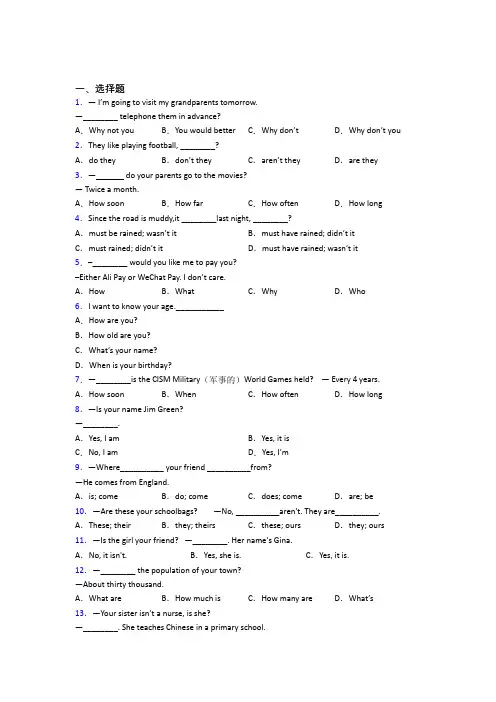
一、选择题1.—I’m going to visit my grandparents tomorrow.—________ telephone them in advance?A.Why not you B.You would better C.Why don’t D.Why don’t you 2.They like playing football, ________?A.do they B.don’t they C.aren’t they D.are they 3.— do your parents go to the movies?— Twice a month.A.How soon B.How far C.How often D.How long 4.Since the road is muddy,it ________last night, ________?A.must be rained; wasn’t it B.must have rained; didn’t itC.must rained; didn’t it D.mu st have rained; wasn’t it5.–________ would you like me to pay you?–Either Ali Pay or WeChat Pay. I don’t care.A.How B.What C.Why D.Who6.I want to know your age.___________A.How are you?B.How old are you?C.What’s your name?D.When is your birthday?7.—________is the CISM Military(军事的)World Games held? — Every 4 years. A.How soon B.When C.How often D.How long 8.—Is your name Jim Green?—________.A.Yes, I am B.Yes, it isC.No, I am D.Yes, I’m9.—Where__________ your friend __________from?—He comes from England.A.is; come B.do; come C.does; come D.are; be 10.—Are these your schoolbags? —No, __________aren't. They are__________. A.These; their B.they; theirs C.these; ours D.they; ours 11.—Is the girl your friend? —________. Her name's Gina.A.No, it isn't. B.Yes, she is. C.Yes, it is.12.—________ the population of your town?—About thirty thousand.A.What are B.How much is C.How many are D.What’s 13.—Your sister isn’t a nurse, is she?—________. She teaches Chinese in a primary school.A.No, she isn’t B.Yes, she is C.Yes, she isn’t D.No, she is 14.We have to swipe our student card (刷学生卡) when we get to or leave school every day, ________ we?A.do B.don’t C.have D.haven’t 15.—This is my pen. _______ this book?—It’s Bob’s. Look, his name is o n it.A.What’s B.Who’s C.What about16.— _______ do you like Sunday?—Because I don’t need to go to school.A.When B.Why C.Where17.—________ are your shoes, dear? — Size 40.A.What’s size B.How much C.What D.What size 18.—Li Ming, can you sing or dance? —________A.Yes, I can. B.I can sing. C.No, I cannot dance. D.No, I couldn’t. 19.— Do you think the students need to have lunch at school?—________ It’s good for them to save time.A.Yes, I think so. B.No, I don’t think so.C.I agree with you. 20.— _____ do you _____ the book?—It’s very interesting.A.What; like B.What; think of C.How; think D.How; think of 21.—__________ will the project of Wuxi Metro Line 3 be completed?—It won’t take long. Just in about 3 months.A.How long B.How far C.How soon D.How often 22.— Look at my new watch.—Well, it’s so cool! When and where________you buy it?A.Do B.will C.did D.Are23.— Could you play the piano when you were 8 years old?— ________.A.Yes, I could B.No, I can’t C.Yes, I can D.No, I won’t 24.—Are you Michael?—________. I'm Jack.A.No, I'm not B.Yes, I am C.No, he isn't D.Yes, he is 25.— __________ books do you read every year?— About 30, I love reading.A.How much B.How old C.How many D.How often【参考答案】***试卷处理标记,请不要删除一、选择题1.D解析:D【解析】【分析】【详解】句意:——我明天将要去拜访我的祖父母。
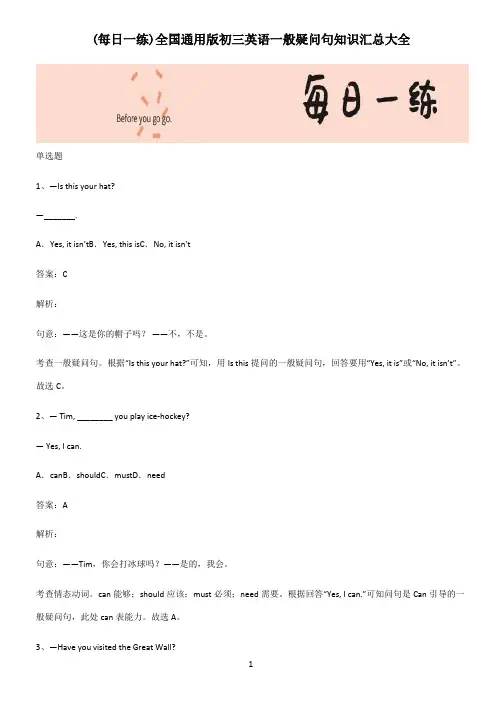
(每日一练)全国通用版初三英语一般疑问句知识汇总大全单选题1、—Is this your hat?—_______.A.Yes, it isn’tB.Yes, this isC.No, it isn’t答案:C解析:句意:——这是你的帽子吗?——不,不是。
考查一般疑问句。
根据“Is this your hat?”可知,用Is this提问的一般疑问句,回答要用“Yes, it is”或“No, it isn’t”。
故选C。
2、— Tim, ________ you play ice-hockey?— Yes, I can.A.canB.shouldC.mustD.need答案:A解析:句意:——Tim,你会打冰球吗?——是的,我会。
考查情态动词。
can能够;should应该;must必须;need需要。
根据回答“Yes, I can.”可知问句是Can引导的一般疑问句,此处can表能力。
故选A。
3、—Have you visited the Great Wall?—_______. I visited it last summer.A.Yes, I didB.Yes, I haveC.Not yet答案:B解析:句意:——你参观过长城吗?——是的。
我去年夏天参观的。
考查一般疑问句的肯定回答。
根据空后的“I visited it last summer”可知,应该是肯定回答,排除C。
Have you……?的一般疑问句肯定回答用Yes, I have,排除A,故选B。
4、—________ I return this book to the library today?—No, you needn’t. You can return it tomorrow.A.CanB.MayC.MustD.Need答案:C解析:句意:——我必须今天把这本书还给图书馆吗?——不,你不必。
你可以明天还。
考查动词辨析和一般疑问句。
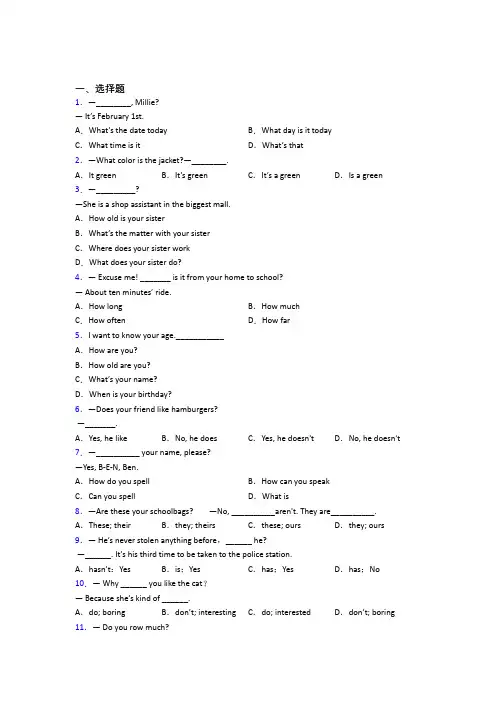
一、选择题1.—________, Millie?—It’s February 1st.A.What’s the date today B.What day is it todayC.What time is it D.What’s that2.—What color is the jacket?—________.A.It green B.It’s green C.It’s a green D.Is a green 3.—_________?—She is a shop assistant in the biggest mall.A.How old is your sisterB.What’s the matter with your sisterC.Where does your sister workD.What does your sister do?4.— Excuse me! _______ is it from your home to school?—About ten minutes’ ride.A.How long B.How muchC.How often D.How far5.I want to know your age.___________A.How are you?B.How old are you?C.What’s your name?D.When is your birthday?6.—Does your friend like hamburgers?—_______.A.Yes, he like B.No, he does C.Yes, he doesn't D.No, he doesn't 7.—__________ your name, please?—Yes, B-E-N, Ben.A.How do you spell B.How can you speakC.Can you spell D.What is8.—Are these your schoolbags? —No, __________aren't. They are__________. A.These; their B.they; theirs C.these; ours D.they; ours 9.— H e’s never stolen anything before,______ he?—______. It’s his third time to be taken to the police station.A.hasn’t:Yes B.is;Yes C.has;Yes D.has;No 10.— Why ______ you like the cat?—Because she’s kind of ______.A.do; boring B.don’t; interesting C.do; interested D.don’t; boring 11.— Do you row much?— Yes, ________.A.for two hours B.quite a lot C.from five o'clock to ten 12.—________ the population of your town?—About thirty thousand.A.What are B.How much is C.How many are D.What’s 13.—________ is it from the New Town to the old city centre?—About 30 minutes by underground.A.How soon B.How often C.How long D.How far 14.—________?—Very nice. I like it very much.A.How do you think of the coat? B.How do you like the coat?C.What do you like the coat? D.What do you think the coat? 15.—How is everything going at school ,dear ?—________.A.All right, thanks. B.Not too bad, I guessC.That’s right.D.I’m glad to hear that.16.—This is my pen. _______ this book?—It’s Bob’s. Look, his name is on it.A.What’s B.Who’s C.What about 17.—________ are your shoes, dear? — Size 40.A.What’s size B.How much C.What D.What size 18.— Excuse me, ________ is it from here to Zhongshan Park?—It's about thirty minutes’ walk.A.how long B.how often C.how far D.how much 19.—Can your brother sing or dance?— .A.He can sing. B.Yes, he can. C.He can sing or dance. 20.— Do you think the students need to have lunch at school?—________ It’s good for them to save time.A.Yes, I think so. B.No, I don’t think so.C.I agree with you. 21.— ________ is the Shanghai Wild Animal Park?—It’s 15km east of the Bund.A.Who B.What C.When D.Where 22.— __________.— He is not very handsome, but he is humorous.A.What does he look? B.What is he like?C.How does he look? D.How does he look like?23.— Look at my new watch.—Well, it’s so cool! When and where________you buy it?A.Do B.will C.did D.Are24.-- ______--No,it’s in the bookcase.A.Where is his dictionary? B.Where are his books?C.Is his book on the desk? D.Is his pencil in the bookcase?25.— do you go to work every day?—By bike.A.What B.Who C.How D.When【参考答案】***试卷处理标记,请不要删除一、选择题1.A解析:A【解析】【分析】【详解】句意:——Millie,今天多少号?——今天二月一日。
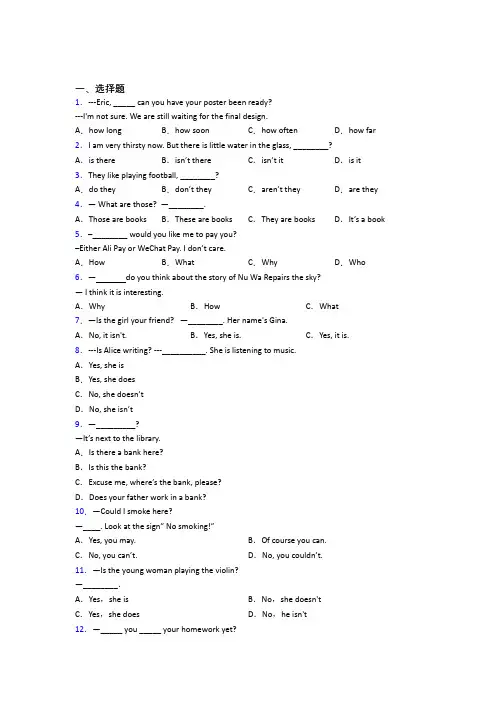
一、选择题1.---Eric, _____ can you have your poster been ready?---I'm not sure. We are still waiting for the final design.A.how long B.how soon C.how often D.how far 2.I am very thirsty now. But there is little water in the glass, ________?A.is there B.isn’t there C.isn’t it D.is it 3.They like playing football, ________?A.do they B.don’t they C.aren’t they D.are they 4.— What are those? —________.A.Those are books B.These are books C.They are books D.It’s a book 5.–________ would you like me to pay you?–Either Ali Pay or WeChat Pay. I don’t care.A.How B.What C.Why D.Who 6.— do you think about the story of Nu Wa Repairs the sky?— I think it is interesting.A.Why B.How C.What7.—Is the girl your friend? —________. Her name's Gina.A.No, it isn't. B.Yes, she is. C.Yes, it is.8.---Is Alice writing? ---__________. She is listening to music.A.Yes, she isB.Yes, she doesC.No, she doesn’tD.No, she isn’t9.—_________?—It’s next to the library.A.Is there a bank here?B.Is this the bank?C.Excuse me, where’s the bank, please?D.Does your father work in a bank?10.—Could I smoke here?—____. Look at the sign” No smoking!”A.Yes, you may. B.Of course you can.C.No, you can’t.D.No, you couldn’t.11.—Is the young woman playing the violin?—________.A.Yes,she is B.No,she doesn'tC.Yes,she does D.No,he isn't12.—_____ you _____ your homework yet?—Yes, I _____ it ten minutes ago.A.Did; do; finished B.Have; done; have finished C.Have; done; finished D.Will; do; finish13.— does he go to visit his grandparents?—Usually twice a month.A.How often B.How soon C.How far D.How long14.—I have too much housework to do at home!—___________ ask your husband for help?A.You could B.Why don’t C.Why not D.How about 15.—How is everything going at school ,dear ?—________.A.All right, thanks. B.Not too bad, I guessC.That’s right.D.I’m glad to hear that.16.—I’m going to visit my grandparents tomorrow.—________ telephone them in advance?A.Why not you B.You would better C.Why don’t D.Why don’t you 17.—________ are your shoes, dear? — Size 40.A.What’s size B.How much C.What D.What size 18.—Li Ming, can you sing or dance? —________A.Yes, I can. B.I can sing. C.No, I cannot dance. D.No, I couldn’t. 19.—Excuse me, ________? —Yes. Go along this street and turn right.A.how can I get to the bookstore B.which is the way to the bookstore C.is there a bookstore near here D.where is the bookstore20.—How much are these postcards?—________.A.There are two B.Not much C.Two pounds D.Very much 21.— ________ is the Shanghai Wild Animal Park?—It’s 15km east of the Bund.A.Who B.What C.When D.Where 22.一______________ do you have a medical examination?一Once a year.A.How soon B.How long C.How often D.How far 23.— __________.— He is not very handsome, but he is humorous.A.What does he look? B.What is he like?C.How does he look? D.How does he look like?24.—Do you have an art festival at school?—Yes, ________.A.we have B.we can C.we do25.— ________do you go to school? — At seven.A.Where B.How C.Why D.When【参考答案】***试卷处理标记,请不要删除一、选择题1.B解析:B【解析】【详解】句意“-艾瑞克,你多久能把海报准备好?-我不确定,我们仍然在等待最后的设计”。
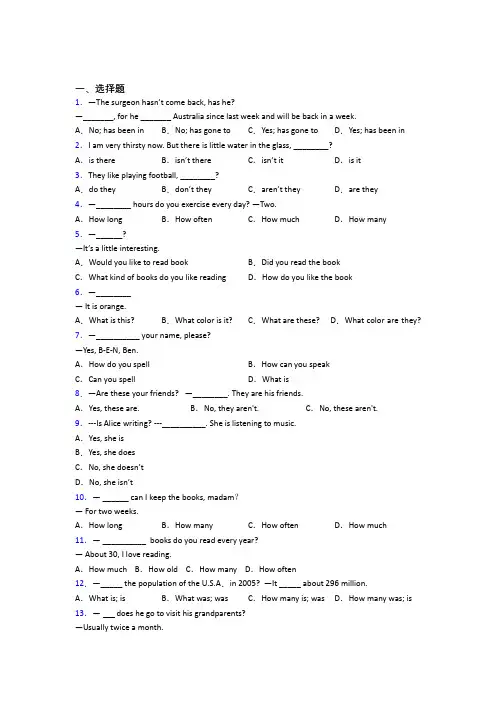
一、选择题1.—The surgeon hasn’t come back, has he?—_______, for he _______ Australia since last week and will be back in a week.A.No; has been in B.No; has gone to C.Yes; has gone to D.Yes; has been in 2.I am very thirsty now. But there is little water in the glass, ________?A.is there B.isn’t there C.isn’t it D.is it3.They like playing football, ________?A.do they B.don’t they C.aren’t they D.are they4.—________ hours do you exercise every day? —Two.A.How long B.How often C.How much D.How many 5.—______?—It’s a little interesting.A.Would you like to read book B.Did you read the bookC.What kind of books do you like reading D.How do you like the book6.—________— It is orange.A.What is this? B.What color is it? C.What are these? D.What color are they? 7.—__________ your name, please?—Yes, B-E-N, Ben.A.How do you spell B.How can you speakC.Can you spell D.What is8.—Are these your friends? —________. They are his friends.A.Yes, these are. B.No, they aren't. C.No, these aren't.9.---Is Alice writing? ---__________. She is listening to music.A.Yes, she isB.Yes, she doesC.No, she doesn’tD.No, she isn’t10.— ______ can I keep the books, madam?— For two weeks.A.How long B.How many C.How often D.How much 11.— __________ books do you read every year?— About 30, I love reading.A.How much B.How old C.How many D.How often12.—_____ the population of the U.S.A.in 2005? —It _____ about 296 million.A.What is; is B.What was; was C.How many is; was D.How many was; is 13.— does he go to visit his grandparents?—Usually twice a month.A.How often B.How soon C.How far D.How long14.—Why not ________him________ some food on the way home?—Good idea!A.to ask; to buy B.ask; buy C.ask; to buy D.to ask; buy 15.—________ are your shoes, dear? — Size 40.A.What’s size B.How much C.What D.What size 16.- ______ do you go to visit your grandparents?- Once a week.A.How far B.How much C.How often D.How long 17.—________do you visit your grandparents, Linda? —Once a month.A.How long B.How much C.How often 18.—Excuse me, ________? —Yes. Go along this street and turn right.A.how can I get to the bookstore B.which is the way to the bookstore C.is there a bookstore near here D.where is the bookstore19.— ___________ do you wear?— Size XL.A.What color B.How much C.What size 20.— Do you think the students need to have lunch at school?—________ It’s good for them to save time.A.Yes, I think so. B.No, I don’t think so.C.I agree with you. 21.—Is Billy rat or thin?—________.A.Yes, he is B.No, he isn't C.He's a new boy D.He's fat 22.— Look at my new watch.—Well, it’s so cool! When and where________you buy it?A.Do B.will C.did D.Are 23.— Could you play the piano when you were 8 years old?— ________.A.Yes, I could B.No, I can’t C.Yes, I can D.No, I won’t 24.—Are you Michael?—________. I'm Jack.A.No, I'm not B.Yes, I am C.No, he isn't D.Yes, he is 25.—Could I smoke here?—____. Look at the sign” No smoking!”A.Yes, you may. B.Of course you can.C.No, you can’t.D.No, you couldn’t.【参考答案】***试卷处理标记,请不要删除一、选择题1.A解析:A【解析】【分析】【详解】句意:--外科医生还没回来,是吗?--不,因为自从上周他就待在澳大利亚,一周之后将会回来。
初中英语语法精讲之疑问句考点归纳与练习疑问句是一种用于询问信息、寻求答案的句子类型。
在写作中,疑问句通常用于提出观点、表达疑虑、引导对话等。
疑问句的类型包括陈述疑问句和特殊疑问句。
陈述疑问句是最常见的类型,它用于询问事实或信息,如“你今天吃了什么早餐?”;特殊疑问句则用于询问特定信息,如“你喜欢吃什么食物?”。
特殊疑问句和陈述疑问句是两种不同类型的疑问句。
它们的主要区别在于所询问的信息类型不同。
特殊疑问句:用于询问特定信息,通常以特殊疑问词开头,如“谁”、“什么”、“为什么”等。
例如:“你是谁?”、“你在哪里?”、“你为什么要这样做?”等等。
特殊疑问句通常需要直接回答提问者想要知道的信息。
陈述疑问句:用于询问事实或信息,通常以陈述句的形式出现,只是末尾加上问号。
例如:“你今天吃了什么早餐?”这种疑问句通常不需要直接回答提问者的问题,而是提供一种机会让对话双方交流信息。
特殊疑问句特殊疑问句在英语中有以下几种类型:What-type question: 用来询问事物的名称或描述,如“What is this?”或“What does this mean?”。
Who-type question: 用来询问人的名称或身份,如“Who is that?”或“Who is the leader of the country?”。
Whose-type question: 用来询问某物属于谁,如“Whose car is this?”或“Whose book is this?”。
Which-type question: 用来询问某物中的某一个选项,如“Which book do you like better?”或“Which season do you like best?”。
When-type question: 用来询问某件事情发生的时间,如“When did you start learning English?”或“When will the exam be held?”。
09 特殊疑问句第一部分语法知识梳理特殊疑问句教材原句①What can | do for you?我能帮你做什么?①How much are they?它们多少钱?①What colour does she like? 她喜欢什么颜色?①How do you pay for it?你怎么付款?1.定义特殊疑问句是指以who,what,whose,which,when,where ,why,how等疑问词开头,对陈述句中某一部分进行提问的句子。
回答时,不用yes或no来回答,而是用一个句子或短语来回答2.用法典例1—How is the young man?_ .A.He's twentyB. He's much betterC.He's a doctorD.He's Mr.Smith解析句意为:——那个年轻人怎么样了?——他好多了。
根据问句中的特殊疑问词How可知,问句是在询问年轻人的状况。
解析B典例2_ does Liu Chuanjian do?_He's a pilot of Sichuan Airlines. He's a hero !A. WhatB. WhereC. When解析句意为:刘传建是干什么的他是四川航空的飞行员。
他是一个英雄!日由回答"He's a pilot of Sichuan Airlines. ”可知,问句在询问职业,故选A项。
解析A典例3do you like the Double Eleven Shopping Festival?1 don't like it, because my mother often buys a lot of things we don't need.A. HowB. WhyC. WhenD. Where解析句意为:你认为双十一购勾物狂欢节怎么样?一我不喜欢它,因为我妈妈经常常买许多我们不需要的东西。
初中英语疑问句分类及应用知识点归纳(经典版)编制人:__________________审核人:__________________审批人:__________________编制单位:__________________编制时间:____年____月____日序言下载提示:该文档是本店铺精心编制而成的,希望大家下载后,能够帮助大家解决实际问题。
文档下载后可定制修改,请根据实际需要进行调整和使用,谢谢!并且,本店铺为大家提供各种类型的经典范文,如职场文书、合同协议、策划方案、规章制度、演讲致辞、应急预案、心得体会、教学资料、作文大全、其他范文等等,想了解不同范文格式和写法,敬请关注!Download tips: This document is carefully compiled by this editor. I hope that after you download it, it can help you solve practical problems. The document can be customized and modified after downloading, please adjust and use it according to actual needs, thank you!Moreover, our store provides various types of classic sample essays, such as workplace documents, contract agreements, planning plans, rules and regulations, speeches, emergency plans, experiences, teaching materials, essay summaries, and other sample essays. If you want to learn about different sample formats and writing methods, please stay tuned!初中英语疑问句分类及应用知识点归纳初中英语疑问句分类及应用知识点归纳在我们的学习时代,很多人都经常追着老师们要知识点吧,知识点也不一定都是文字,数学的知识点除了定义,同样重要的公式也可以理解为知识点。
一、选择题1.— Do you row much?— Yes, ________.A.for two hours B.quite a lot C.from five o'clock to ten 2.— do your parents go to the movies?— Twice a month.A.How soon B.How far C.How often D.How long3.I want to know your age.___________A.How are you?B.How old are you?C.What’s your name?D.When is your birthday?4.—________is the CISM Military(军事的)World Games held? — Every 4 years.A.How soon B.When C.How often D.How long5.—Is there in the room? — . There is only one old desk.A.anything special; Yes B.anything special; NoC.special anything; Yes D.special anything; No6.—Is your name Jim Green?—________.A.Yes, I am B.Yes, it isC.No, I am D.Yes, I’m7.—________— It is orange.A.What is this? B.What color is it? C.What are these? D.What color are they? 8.—Is your name Kangkang? —________A.Yes, I am. B.No, I’m not.C.Yes, it is. D.Yes, it’s. 9.—Mr. Brown,__________ your telephone number 6807-5335? —Yes,__________. A.are; it is B.is; it is C.is; it's D.do;it is10.—Is the girl your friend? —________. Her name's Gina.A.No, it isn't. B.Yes, she is. C.Yes, it is.11.---Is Alice writing? ---__________. She is listening to music.A.Yes, she isB.Yes, she doesC.No, she doesn’tD.No, she isn’t12.I am very thirsty now. But there is little water in the glass, ________?A.is there B.isn’t there C.isn’t it D.is it13.—_________?—It’s next to the library.A.Is there a bank here?B.Is this the bank?C.Excuse me, where’s the bank, please?D.Does your father work in a bank?14.—________?—Very nice. I like it very much.A.How do you think of the coat? B.How do you like the coat?C.What do you like the coat? D.What do you think the coat? 15.— do you go to work every day?—By bike.A.What B.Who C.How D.When 16.— ________do you go to school? — At seven.A.Where B.How C.Why D.When 17.—________, Millie?—It’s February 1st.A.What’s the date today B.What day is it todayC.What time is it D.What’s that18.—This is my pen. _______ this book?—It’s Bob’s. Look, hi s name is on it.A.What’s B.Who’s C.What about 19.—Li Ming, can you sing or dance? —________A.Yes, I can. B.I can sing. C.No, I cannot dance. D.No, I couldn’t. 20.—Is Billy rat or thin?—________.A.Yes, he is B.No, he isn't C.He's a new boy D.He's fat 21.—__________ will the project of Wuxi Metro Line 3 be completed?—It won’t take long. Just in about 3 months.A.How long B.How far C.How soon D.How often 22.-- ______--No,it’s in the bookcase.A.Where is his dictionary? B.Where are his books?C.Is his book on the desk? D.Is his pencil in the bookcase?23.— I want to make some drink with honey. _______ spoons of honey do we need?— I think we need 3.A.How about B.How much C.How many 24.—Why not ________him________ some food on the way home?—Good idea!A.to ask; to buy B.ask; buy C.ask; to buy D.to ask; buy 25.— ______ can I keep the books, madam?— For two weeks.A.How long B.How many C.How often D.How much【参考答案】***试卷处理标记,请不要删除一、选择题1.B解析:B【解析】【分析】【详解】句意:——你常划船吗?——是的,相当多。
一、选择题1.- ______ do you go to visit your grandparents?- Once a week.A.How far B.How much C.How often D.How long 2.—________ do you play computer games, Lily?—I only play on Friday night.A.How B.Where C.Why D.When 3.–________ would you like me to pay you?–Either Ali Pay or WeChat Pay. I don’t care.A.How B.What C.Why D.Who4.I want to know your age.___________A.How are you?B.How old are you?C.What’s your name?D.When is your birthday?5.— do you think about the story of Nu Wa Repairs the sky?— I think it is interesting.A.Why B.How C.What6.—Is there in the room? — . There is only one old desk.A.anything special; Yes B.anything special; NoC.special anything; Yes D.special anything; No7.—Is your name Jim Green?—________.A.Yes, I am B.Yes, it isC.No, I am D.Yes, I’m8.—Is your name Kangkang? —________A.Yes, I am. B.No, I’m not.C.Yes, it is. D.Yes, it’s. 9.—Where__________ your friend __________from?—He comes from England.A.is; come B.do; come C.does; come D.are; be 10.—________. —It's under the chair.A.Where is my basketball? B.Where are my keys? C.Is it a basketball? 11.— ______ can I keep the books, madam?— For two weeks.A.How long B.How many C.How often D.How much 12.—_____ you _____ your homework yet?—Yes, I _____ it ten minutes ago.A.Did; do; finished B.Have; done; have finishedC.Have; done; finished D.Will; do; finish13.—Your sister isn’t a nurse, is she?—________. She teaches Chinese in a primary school.A.No, she isn’t B.Yes, she is C.Yes, she isn’t D.No, she is 14.We have to swipe our student card (刷学生卡) when we get to or leave school every day, ________ we?A.do B.don’t C.have D.haven’t 15.—________do you visit your grandparents, Linda? —Once a month.A.How long B.How much C.How often16.The poor man needs our help, he?A.need B.needn't C.does D.doesn't 17.—Can your brother sing or dance?— .A.He can sing. B.Yes, he can. C.He can sing or dance. 18.— ___________ do you wear?— Size XL.A.What color B.How much C.What size19.— _____ do you _____ the book?—It’s very interesting.A.What; like B.What; think of C.How; think D.How; think of 20.—Is Billy rat or thin?—________.A.Yes, he is B.No, he isn't C.He's a new boy D.He's fat 21.—__________ will the project of Wuxi Metro Line 3 be completed?—It won’t take long. Just in about 3 months.A.How long B.How far C.How soon D.How often 22.— Books are our friends. ________ do you read books?— I read books every day.A.How soon B.How much C.How often23.—Do you have an art festival at school?—Yes, ________.A.we have B.we can C.we do24.—I have too much housework to do at home!—___________ ask your husband for help?A.You could B.Why don’t C.Why not D.How about 25.—The surgeon hasn’t come back, has he?—_______, for he _______ Australia since last week and will be back in a week.A.No; has been in B.No; has gone to C.Yes; has gone to D.Yes; has been in 【参考答案】***试卷处理标记,请不要删除一、选择题1.C解析:C【解析】【详解】句意:-你多久去看望你的祖父母一次?-一周一次。
一、选择题1.—Your sister isn’t a nurse, is she?—________. She teaches Chinese in a primary school.A.No, she isn’t B.Yes, she is C.Yes, she isn’t D.No, she is 2.—________ is it from your home to school?—It’s about ten minutes’ walk.A.How long B.How far C.How many3.—________is the CISM Military(军事的)World Games held? — Every 4 years. A.How soon B.When C.How often D.How long 4.—Is there in the room? — . There is only one old desk.A.anything special; Yes B.anything special; NoC.special anything; Yes D.special anything; No5.—Does your friend like hamburgers?—_______.A.Yes, he like B.No, he does C.Yes, he doesn't D.No, he doesn't 6.—Is your name Jim Green?—________.A.Yes, I am B.Yes, it isC.No, I am D.Yes, I’m7.—__________ your name, please?—Yes, B-E-N, Ben.A.How do you spell B.How can you speakC.Can you spell D.What is8.—Is the girl your friend? —________. Her name's Gina.A.No, it isn't. B.Yes, she is. C.Yes, it is.9.---Is Alice writing? ---__________. She is listening to music.A.Yes, she isB.Yes, she doesC.No, she doesn’tD.No, she isn’t10.— ______ can I keep the books, madam?— For two weeks.A.How long B.How many C.How often D.How much 11.— Do you row much?— Yes, ________.A.for two hours B.quite a lot C.from five o'clock to ten 12.—________ this? —It’s an apple.A.What’re B.what’s C.What’s D.what13.What ______ your dream home ______?A.does; look B.does; likeC.is; like D.is; look like14.—Why not ________him________ some food on the way home?—Good idea!A.to ask; to buy B.ask; buy C.ask; to buy D.to ask; buy 15.—I’m going to visit my grandparents tomorrow.—________ telephone them in advance?A.Why not you B.You would better C.Why don’t D.Why don’t you 16.— _______ do you like Sunday?—Because I don’t need to go to school.A.When B.Why C.Where17.—________ are your shoes, dear? — Size 40.A.What’s size B.How much C.What D.What size 18.- ______ do you go to visit your grandparents?- Once a week.A.How far B.How much C.How often D.How long 19.—Li Ming, can you sing or dance? —________A.Yes, I can. B.I can sing. C.No, I cannot dance. D.No, I couldn’t. 20.— ________ is the Shanghai Wild Animal Park?—It’s 15km east of the Bund.A.Who B.What C.When D.Where 21.— __________.— He is not very handsome, but he is humorous.A.What does he look? B.What is he like?C.How does he look? D.How does he look like?22.— Books are our friends. ________ do you read books?— I read books every day.A.How soon B.How much C.How often23.We have to swipe our student card (刷学生卡) when we get to or leave school every day, ________ we?A.do B.don’t C.have D.haven’t 24.—Hello!Are you Helen?—.My name’s Tina.A.Yes,I am B.Yes,it is C.No,I’m not25.— does he go to visit his grandparents?—Usually twice a month.A.How often B.How soon C.How far D.How long【参考答案】***试卷处理标记,请不要删除一、选择题1.A解析:A【解析】【分析】【详解】句意:——你的姐姐不是护士,对吗?——对,她不是护士。
一、选择题1.—How is everything going at school ,dear ?—________.A.All right, thanks. B.Not too bad, I guessC.That’s right.D.I’m glad to hear that.2.—_____ the population of the U.S.A.in 2005? —It _____ about 296 million.A.What is; is B.What was; was C.How many is; was D.How many was; is 3.—________ this? —It’s an apple.A.What’re B.what’s C.What’s D.what 4.—What color is the jacket?—________.A.It green B.It’s green C.It’s a green D.Is a green 5.—________ do you play computer games, Lily?—I only play on Friday night.A.How B.Where C.Why D.When6.–________ would you like me to pay you?–Either Ali Pay or WeChat Pay. I don’t care.A.How B.What C.Why D.Who7.— do you think about the story of Nu Wa Repairs the sky?— I think it is interesting.A.Why B.How C.What8.—________ hours do you exercise every day? —Two.A.How long B.How often C.How much D.How many 9.—Is your name Kangkang? —________A.Yes, I am. B.No, I’m not.C.Yes, it is. D.Yes, it’s. 10.—Is the girl your friend? —________. Her name's Gina.A.No, it isn't. B.Yes, she is. C.Yes, it is.11.—________ is it from the New Town to the old city centre?—About 30 minutes by underground.A.How soon B.How often C.How long D.How far 12.—_____ you _____ your homework yet?—Yes, I _____ it ten minutes ago.A.Did; do; finished B.Have; done; have finishedC.Have; done; finished D.Will; do; finish13.—The surgeon hasn’t come back, has he?—_______, for he _______ Australia since last week and will be back in a week.A.No; has been in B.No; has gone to C.Yes; has gone to D.Yes; has been in 14.—Hello!Are you Helen?—.My name’s Tina.A.Yes,I am B.Yes,it is C.No,I’m not 15.—This is my pen. _______ this book?—It’s Bob’s. Look, his name is on it.A.What’s B.Who’s C.What about16.— _______ do you like Sunday?—Because I don’t need to go to school.A.When B.Why C.Where17.- ______ do you go to visit your grandparents?- Once a week.A.How far B.How much C.How often D.How long 18.—Li Ming, can you sing or dance? —________A.Yes, I can. B.I can sing. C.No, I cannot dance. D.No, I couldn’t. 19.— _____ do you _____ the book?—It’s very interesting.A.What; like B.What; think of C.How; think D.How; think of 20.—________?—It's November 8th.A.What's date today? B.What date is it? C.What day is it? D.What's the time? 21.— ________ is the Shanghai Wild Animal Park?—It’s 15km east of the Bund.A.Who B.What C.When D.Where22.一______________ do you have a medical examination?一Once a year.A.How soon B.How long C.How often D.How far 23.—Are you Michael?—________. I'm Jack.A.No, I'm not B.Yes, I am C.No, he isn't D.Yes, he is 24.— Books are our friends. ________ do you read books?— I read books every day.A.How soon B.How much C.How often25.---Eric, _____ can you have your poster been ready?---I'm not sure. We are still waiting for the final design.A.how long B.how soon C.how often D.how far【参考答案】***试卷处理标记,请不要删除一、选择题1.B【解析】【分析】【详解】句意:——亲爱的,学校一切都好吗?——我想还不错。
考查交际应用。
All right ,thanks好的,谢谢;Not too bad ,I guess我想还不错;That’s right 没错;I’m glad to hear that听你这么说真高兴,根据问句How is everything going at school ,dear可知,Not too bad ,I guess最符合语境,故选B。
2.B解析:B【解析】【分析】【详解】句意:——美国2005年的人口是多少?——约2亿9600万。
询问人口多少使用句型“What’s the population of……?”不用How many来提问,排除C,D;根据“in 2005”判断,表示过去的时间状语,句子用一般过去时来表达。
所以选B。
3.C解析:C【解析】【分析】【详解】句意:——这是什么?——它是一个苹果。
考查特殊疑问句。
What’re什么是;what’s什么是;What’s什么是;what什么;根据句意理解及英语常识可知,这里表达的是“是什么”,且由回答It’s an apple.可知,这里应该提问的是单数,且位于句首要大写,故选C。
【点睛】英语中书写要注意首字母大写的问题。
不管是段落开头还是句子开头,只要是开头,首字母一定要大写。
比如本题中特殊疑问词what是放在句首,首字母w就要大写,变成What 才可以。
4.B解析:B【解析】【分析】【详解】句意:——这个夹克是什么颜色?——是绿色的。
考查特殊疑问句。
根据句意理解可知,问句问的是“什么颜色”,且主语是the jacket,是指物的名词,所以答句中应该用it指代,结构是“It is+颜色”,而颜色的词是形容词,前面不需要加冠词,故选B。
5.D【解析】【分析】【详解】句意:——莉莉,你什么时候玩电脑游戏?——我只在周五晚上玩。
考查疑问词,A. How怎样;B. Where哪里;C. Why为什么;D. When何时。
结合回答,应该是对时间的提问,故选D。
6.A解析:A【解析】【分析】【详解】句意:——您希望我怎样付款?——支付宝支付或微信支付都行。
我不在意。
A.How怎样;B. What什么;C. Why为什么;D. Who谁。
根据答语Either Ali Pay or WeChat Pay. 支付宝支付或微信支付都行。
可知,上文问的是支付方式,因此用how来提问。
故选A。
7.C解析:C【解析】【分析】【详解】句意:——你觉得女娲补天的故事怎么样?——我认为它很有趣。
考查特殊疑问句。
Why为什么;How怎样;What什么,根据句型What do you think about……?意为“你认为……怎么样?”,故选C。
8.D解析:D【解析】【分析】【详解】句意:——你每天锻炼几个小时?——两个小时。
考查特殊疑问句。
How long多长时间;How often多久一次;How much多少钱或多少(不可数名词);How many多少(可数名词),提问数量,根据答语Two,可知用How many,此外How long和How often的后面不跟名词,由空格后的名词复数hours,所以用How many,故选D。
【点睛】How long和How often的主要区别:How long多久了(问时长),以For+时间段或since +时间点作答。
How often多经常(问频率),常以数词+ times a week(month 、year……)作答。
How much与How many的区别:都是就数量提问,但how much +不可数名词,而howmany+可数名词复数9.C解析:C【解析】【分析】【详解】句意:——你的名字是康康么?——是的,我的名字是康康。